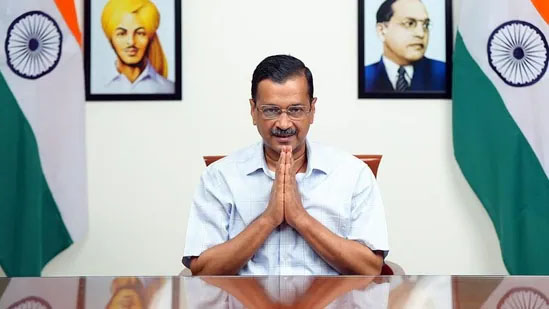NEW DELHI, June 24
The Supreme Court on Monday adjourned till June 26 the hearing on Delhi Chief Minister Arvind Kejriwal’s plea challenging the Delhi High Court order putting on hold the bail granted to him by a trial court in a money laundering case registered by the Enforcement Directorate (ED) in connection with the alleged excise policy scam.
A vacation bench of Justices Manoj Misra and S V N Bhatti took note that the high court is yet to pronounce the final order in the matter.
“Perusal of the impugned order would reveal that parties were given opportunities to file short submissions by June 24, 2024. Additional Solicitor General S V Raju who appears for the Enforcement Directorate submits that the order on the stay application would be passed shortly and therefore it would be appropriate that this court adjourns the proceedings to a date so that it may have opportunity of going through the order. In the facts of the case, we deem it appropriate to direct that this matter, be put up day after tomorrow.. in the meantime, if an order is passed by the High Court, copy of the same shall be brought on record,” the bench ordered.
The bench said it would wait for the high court order to come on record without which it would not be able to ascertain the reasoning. “Normally, in a stay order, judgments are not reserved. They are passed at the hearing itself on the spot. So, bit unusual, but we will have it day after tomorrow,” said Justice Misra.
While Kejriwal’s counsel questioned the manner in which the high court put the trial court order on hold, the ED contended that the trial court had admitted that it had passed the order without going through all the case records.
Appearing for Kejriwal, Senior Advocate A M Singhvi said, “Contrary to Your Lordships well-established norms that a bail granted is very different from a bail reversed or cancelled, after the bail is granted on June 20, Mr Raju makes a mention to the High Court on June 21.
At the mentioning stage itself, in my presence, the learned judge stays this order. he then proceeds to hear us for some time that day at length and then reserves order…. The procedure of staying bail on the first day, first attempt, first challenge is unprecedented. Second and more important balance of convenience is totally in my favour.
If the judgement is reversed, the man will go back to jail as he did after three weeks out under a Supreme Court direction. The Supreme Court had directed him to be out for 2 1/2 — 3 weeks. He went back immediately.”
Singhvi said that Kejriwal is “not a flight risk” and is “certainly not somebody who can be controlled”.“Suppose the high court dismisses the appeal, how do they compensate for the loss of time in which I have been kept behind after having got bail? The procedure is unknown. The stay is granted first and arguments are heard later,” he added.
Justice Misra pointed out that as per the interim order, the parties were given time till January 24 to file short written submissions and added that this means “the order is likely to come shortly in a day or two”. “If we pass an order right now, we will only be prejudging the issue. It is a high court which is hearing the matter, not a subordinate court,” the judge added.
Senior Advocate Vikram Chaudhary also appearing for Kejriwal referred to the Supreme Court order granting him interim bail. He submitted that the apex court had said that “no doubt, serious allegations have been made, but he has not been convicted. He does not have any criminal antecedents, he is not a threat to the society. The investigation in the present case has remained pending since August 2022”.
Solicitor General Tushar Mehta, however, said the interim bail was for the limited purposes of campaigning for the Delhi Assembly polls.
Chaudhary also said the Supreme Court had given him liberty to file a bail application before the trial court.Singhvi said, “The (HC) judge prejudges the matter at 10.30 am because an order is passed without reasons”.The court asked whether the satisfaction with regard to the twin conditions in Section 45 was recorded in the trial court order. “No,” said Raju.
Mehta said, “The (trial) court starts by saying this is a high-profile case which it is not. For the court, every person is an aam aadmi and nobody is high profile or low profile..”.
“More importantly, the court records in the order that who has the time to go through the record of the case. Therefore, that condition (under section 45) is not satisfied. It is violative of Section 45”, Mehta added.
“The court says it has not looked at the papers and has passed the order. How can the order be passed?” Raju added.



























